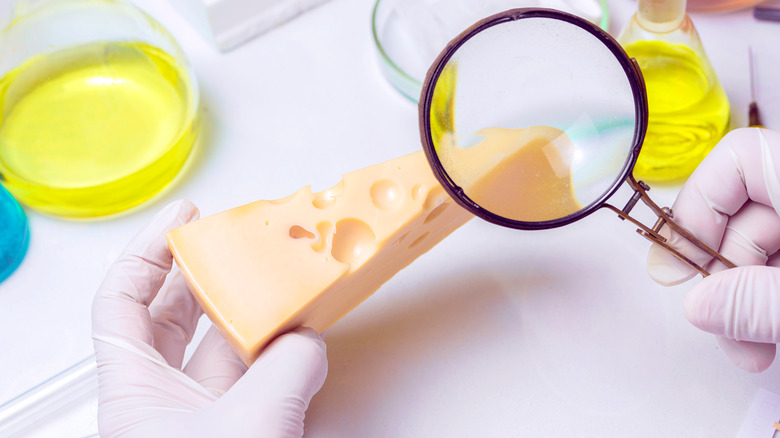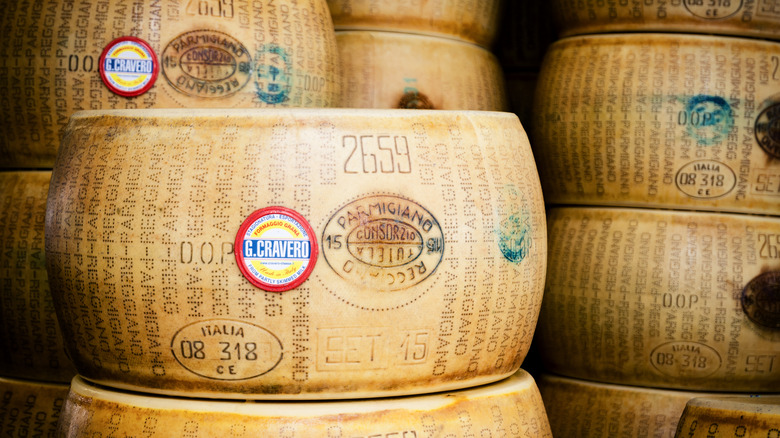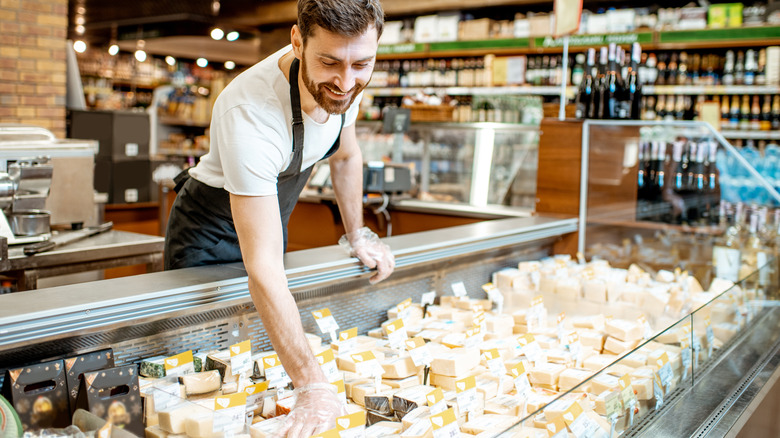The Clever Way Some Cheesemakers Are Fighting Cheese Fraud
Have you heard the one about the cheese burglar who stole a spicy block of queso? The owner chased after him yelling, "Hey, that's nacho cheese!" All dad jokes aside, cheese fraud is big business that negatively affects cheese producers, retailers, and consumers. Thankfully, fromage fraudsters may soon watch their profits melt away, as Food & Wine warns that the makers of authentic Parmigiano Reggiano plan to use digital trackers to combat imposter cheeses.
The cheese industry has had its fair share of controversy. In 2016, TIME revealed a jaw-dropping report on manufacturers like Castle Cheese, which produced "Parmesan" that contained significant amounts of wood pulp, or cellulose, as a filler. Some experts believe about a fifth of the Parmesan cheese bought at grocery stores is mislabeled.
The Globe and Mail says that Switzerland's iconic Emmentaler (Swiss cheese) is also often a victim of identity theft. Representatives for Emmentaler cheesemakers say that around 10% of the Swiss cheese on the market is fake. The knock-offs are hard to spot, and the holes (pun intended) in their flavor profile can damage producers' reputations if disappointed consumers think they're getting the real deal.
Top-selling cheeses from Manchego to Camembert are prime targets for fraudsters, but premium Italian cheeses are hit particularly hard. Sales of Parmigiano Reggiano cheese are about $2.44 billion, says Food & Wine, but fake Parmesan takes an almost equal wedge of the wheel with sales at $2.08 billion.
What makes cheese authentic and how is it currently tracked?
According to Culture Cheese Magazine, an authentic cheese can qualify for official status when it is made in a particular region following a specific recipe and aging guidelines. The European Union created these guidelines along with the protected designation of origin (PDO) certification that is the mark of an authentic cheese. Each country develops its own quality control restraints and certification counsels in an effort to lessen cheese fraud.
The Globe and Mail says that Switzerland's Agroscope Liebefeld-Posieux (ALP) governmental research cultivates 170 bacteria strains specific to Emmentaler cheese and delivers the strains to approved producers. These bacteria have specific and traceable DNA sequences that help the ALP identify real Swiss cheese. Questionable batches of Emmentaler are sent to the ALP for a DNA test that takes 24 hours to determine the authenticity of the bacteria in the cheese sample.
When it comes to Parmesan cheese in the U.S., VinePair explains that there aren't any regulations to verify authenticity like there are in Italy, which names and certifies types of Parmesan by specific regions. Food & Wine notes that cheeses like Parmigiano Reggiano are regulated by the Parmigiano Reggiano Consortium, which has attempted to control fraud by marking the hard rind of the cheese wheel with alphanumeric codes.
Varied methods of tracking authentic cheeses have proven to be time-consuming and sometimes less effective than cheese producers and buyers would like, but a new digital technology aims to fix those problems — cheese fraudsters beware.
New digital cheese labels grate on fraudsters' nerves
Cheesemakers are implementing 21st century technology to protect their age-old tradition of making high-quality, certified cheeses from fraudsters looking to turn a profit with incomparable knock-offs. According to Food Navigator, producers of Parmigiano Reggiano make around 6,000 tons of the hard Italian cheese annually. That's a lot of wheels to track, especially when using outdated monitoring methods.
The Parmigiano Reggiano Consortium announced that it plans to use a silicon tracking chip (which is smaller than a salt grain) in combination with a casein marker to track certified cheeses. In 2002, Dutch company Kaasmerk Matec began supplying the consortium with a cheese marker made of casein, glycerol, and alcohol that could be applied to cheeses during production and used to track them for authenticity. The consortium improved the markers by integrating them with a food-safe micro transponder developed by the p-Chip Corporation.
The digital chips can withstand the elements and, when combined with traditional casein markers, offer unmatched tracking capabilities. After two years of testing, the consortium plans to use the digital tracking method on 100,000 wheels of Parmigiano Reggiano in 2022. If all goes well, the trackers may be placed in all Parmigiano Reggiano production and could have positive implications for cheesemakers fighting fraud.


